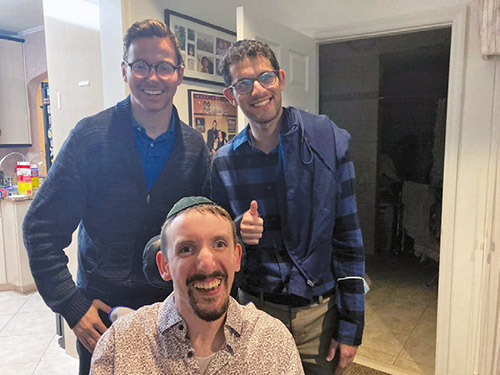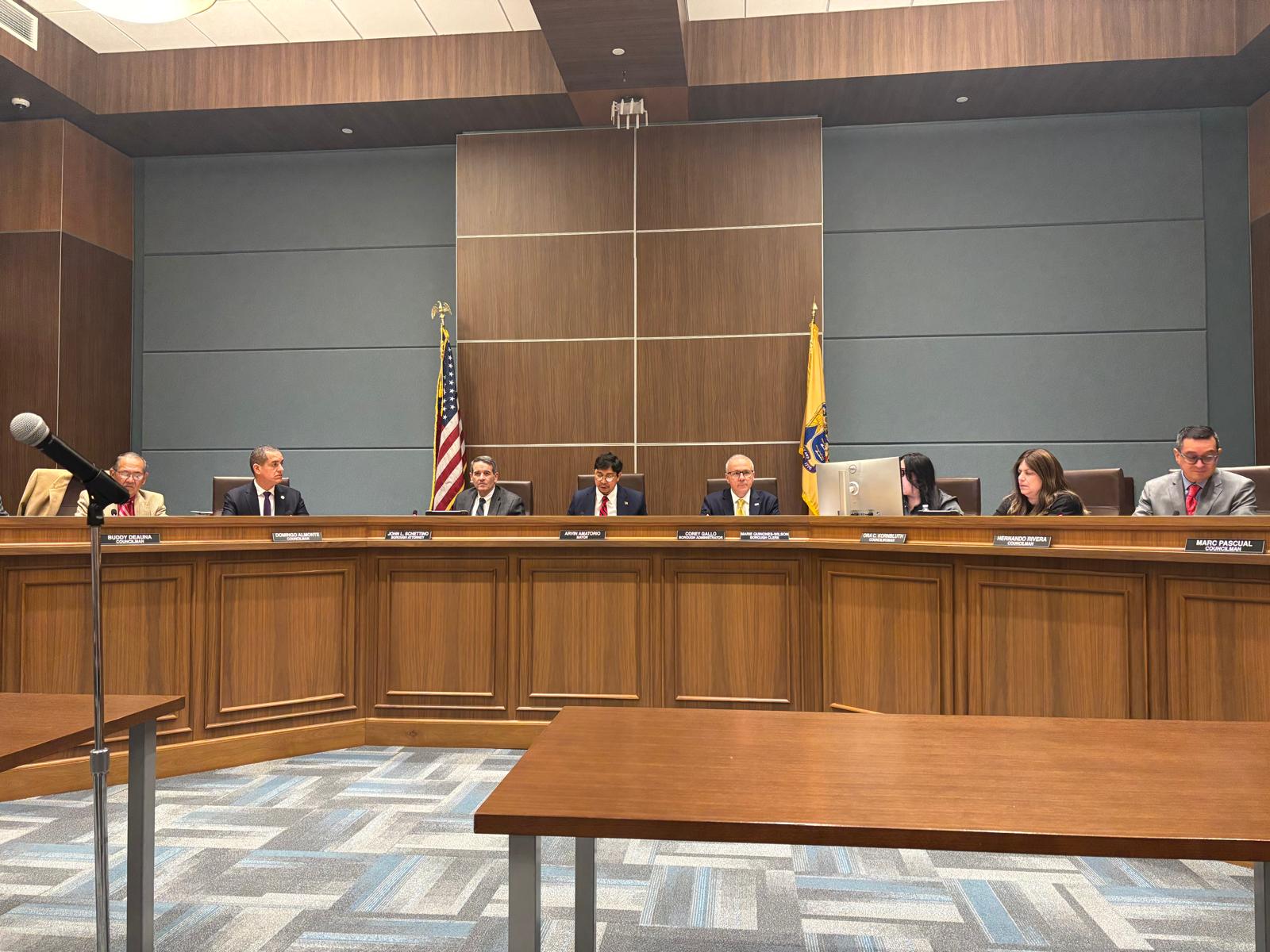

Growing up, my role models consisted of famous athletes and TV actors. At social gatherings, I would recite witty one-liners, like Adam Sandler. While shooting hoops at home, I would dress up in a Kevin Durant jersey and matching shorts to mimic the Durnachila (Nickname for Durant). Along the journey of life, guys’ role models change as they mature. By adulthood, males typically garner emotional maturity and seek out non-pop culture role models for inspiration. For adults, a role model need not be a rabbi, doctor, rich lawyer or investment banker. Three years ago, this writer encountered New Jersey’s most inspiring role model.
In the fall of 2019, I received a second chavrutah—learning partner for Gemara class. In most Gemara classes, students typically have one chavrutah to study with. However, my current learning partner, Ely (“Gins”) Ginsberg wanted to make an exception for YU’s longest-reigning senior, Zack Pollack. At first glance, observers will notice Zack’s obvious limitations. Unlike most 26-year-olds, Zack requires a wheelchair in order to move around. Unlike other YU students, Zackattends bi-weekly physical and speech therapy sessions. At 8 months old, doctors diagnosed Zack with cerebral palsy, a lifelong neurological disorder that limits one’s voluntary movements, balance and body posture.
Over the course of our learning sessions and lunch discussions, I learned a few things about my chavrutah’s disability. For starters, Zack has zero control of his arms and legs. To get anywhere, Zack requires a helper to push his wheelchair. To eat or drink, Zack needs 100 % peer assistance. During conversation, Zack requires triple the amount of time and effort that others need to recite a single sentence. Frankly, the presence of each devastating limitation would tempt any ordinary human to develop a pessimistic life outlook and lazy habits. Yet, Zack has showcased contrary behavior patterns.
For nearly 22 years, Zack has never missed a physical therapy session nor skipped Gemara class. At weddings, Zack loves to go center circle and dance with the groom. Before the pandemic, Zack delivered weekly motivational speeches to elementary school children across New Jersey and New York. Unlike other students in Gemara class, Zack would ask our rebbe, Rabbi Netanel Wiederblank, to review complicated points. “Say it again, Rebbe.” What was that, Rebbe?” Zack’s relentless drive for Torah and life inspires nearby peers and neighbors to reach for the stars.
During my time at YU, “Gins” would host Zack for a few Shabbatot each semester. Mid-Shabbat afternoon, I would push Zack around the Heights. On one afternoon, Zack relayed to me his dream. “One day I want to be a world- renowned motivational speaker. I want to tell everyone about the importance of believing in themselves.” YU Rosh Yeshiva, and Zack’s neighbor, Rabbi Elchanan Adler, offered a great insight about Zack’s inspiring words. “Zack teaches us that life’s not about achieving this or that. It’s about fulfilling our own potential.” Zack’s presence and speeches inspire others to achieve their best. Not your neighbor’s best or your sister’s best, but your best.
Last week, this author and Moshe (Martin) Rosenbaum took Zack for a Sunday afternoon park stroll. Pulled over to the side, I asked Zack a catching up question. “How was your Simchat Torah?” Eyebrows raised and cheekbones extended, Zack offered a memorable reply. “Simchat Torah was the first time I went to shul in a long time. People came over to me in shul and said hello. They let me do Mipi Keil. Baruch Hashem, it was great.”
Following the conversation, I asked Zach another question. “How are you doing?” Unresponsive for a second, Zack relayed an honest reply. “It’s been pretty tough. Physically, emotionally, things have been really hard. But baruch Hashem, I’m doing better. But things are tough.” Unsure of what to respond, I replied—in retrospect somewhat patronizingly—“Thank God. Those experiences make you stronger. You’re probably stronger now than you ever were.” To quote a close friend of mine, Max Gruber, “Sometimes, people just want to be heard.” You don’t need to provide feel-good comments after any friend’s unhappy statement.
After passing a few trees, I opened up to Zack about my own challenges. “Recently, there’s been a few disappointments in my life too. My relative is in a rehab center. Other realms of life haven’t been working out. It’s a tough zone.” Within seconds, Zack offered me a line of encouragement. “You gotta fight, Yosef. You gotta fight. Things get tough, but you gotta fight.”
Hearing these words from a man facing unimaginably difficult challenges penetrated my soul. Fight, fight, fight. No matter what you’re going through. If a family member ends up in the hospital, fight to keep your loved ones emotionally strong. If you don’t get accepted to graduate school, fight for an admissions spot next year around. If on a date, the girl makes up an excuse to leave after an hour, fight off your low self confidence and call up another shadchan.
Following the park stroll, Zack, Moshe and I went for ice cream. During the sit down, Zack related grateful comments about having unbelievably caring parents. “After going through this stuff, I realize how amazing my parents are. Every morning, I give my mom a hug.” Zack’s words should inspire us to show similar amounts of gratitude for our own parent’s relentless efforts.
Peter Himmelman once wrote a song titled, “Woman With the Strength of 10,000 Men.” Mr. and Mrs. Pollack have the combined strength of 1,000,000 men. For 26 years, this couple has worked day and night to give Zack the opportunity to fulfill his mission on earth. This power couple wakes up early and stays up late to help Zack do everything. Mrs. Pollack provides eating and drinking assistance for Zack. Mr. Pollack helps Zack get ready for school. Mrs. Pollack drives Zack to and from YU. Mr. Pollack brings Zack to shul and all of YU’s epic mesibot.
Despite Zack’s physical limitations, the entire Pollack family has traveled to Barcelona, Israel and many other exotic places. The Pollacks have two other children, earn a livelihood and simultaneously give Zack unbelievable treatment and care. Please God, one day I hope to devote 1/100th the amount of care Zack’s parents provide their family, to my own children.
Meeting Zack and the Pollacks has taught me a few life changing lessons. For starters, any parent of a child with physical or emotional disabilities deserves community-wide respect. These people dedicate hours of effort and attention to give their child or children a good life. Respect these people. Get brachot from these people. Marry their children. Hire their children.
Secondly, Zack’s resilience amid challenges teaches people to never give up. The Kaballah famously says, “Ain davar omed lifnei haratzon”—Nothing can stand in the way of a human’s will.” If a person works hard enough, challenges and limitations will not hinder their success.
To quote a former student of mine, “I wouldn’t change anything about myself. Our imperfections are what make us great.”
If anyone wants to hear awesome chizuk from Zack at their yeshiva or shul, please go to Zack’s website, www.Zackinspires.com and reach out.
The author would like to give article title credits to Rabbi Neil Fleischman.
By Yosef Silfen













